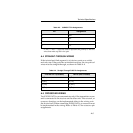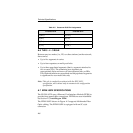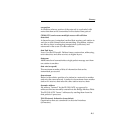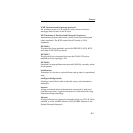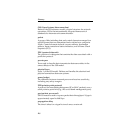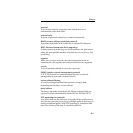
B-6
Glossary
internetworking
The linking of one or more networks to facilitate communication
across networks.
interoperability
The ability of equipment from multiple vendors to exchange
information using standardized protocols.
IP (Internet protocol)
IP is the basic datagram protocol used at the network layer of the
TCP/IP stack.
ISO (International Standards Organization)
An organization that creates, controls and publishes standards.
jitter
Clocking deviation on a network.
Kbps (kilobits per second)
1,000 bits per second.
LAN (local area network)
A network that interconnects a variety of devices (computers,
printers, servers, and so on), within a limited geographical area. A
LAN typically connects devices within a building or campus.
link-loss budget
Each connection (link) in an optical system results in a certain
amount of signal strength loss. Link-loss budget refers to the
process of calculating link loss for the entire system. If the total link
loss exceeds a certain limit, the system will not function.
LLC (logical link control)
A part of the data link layer of the OSI model that defines the
transmission of a frame of data between two stations (with no
intermediate switching nodes).
local traffic
Traffic within a given network segment.



